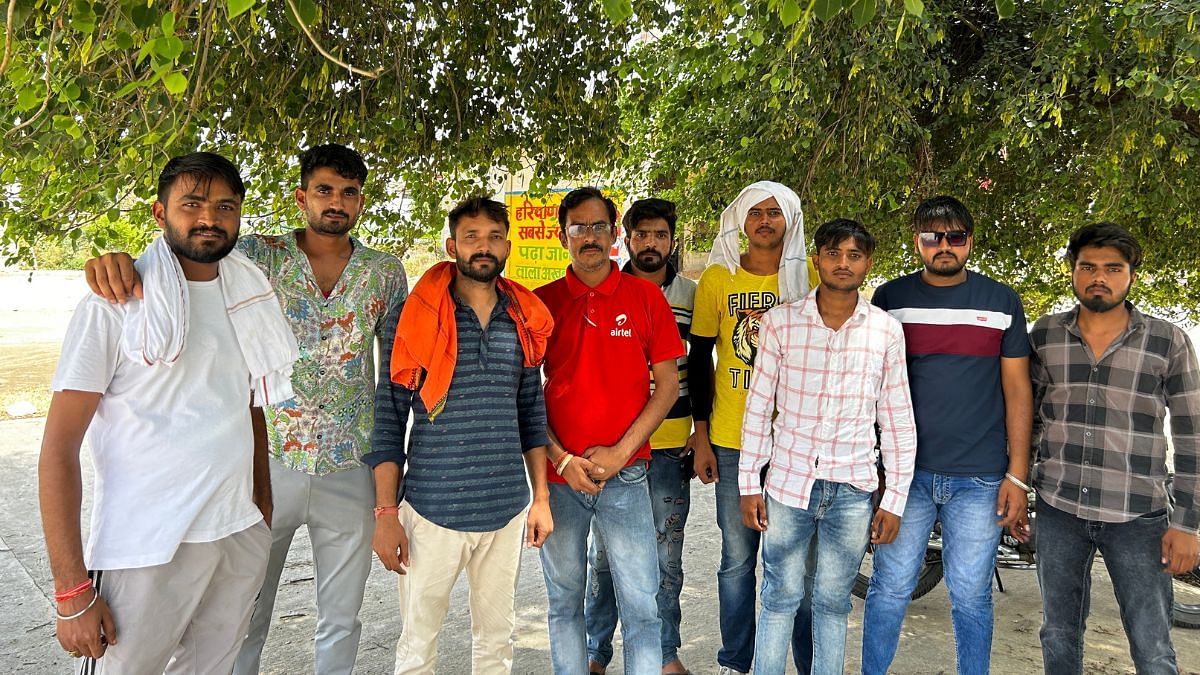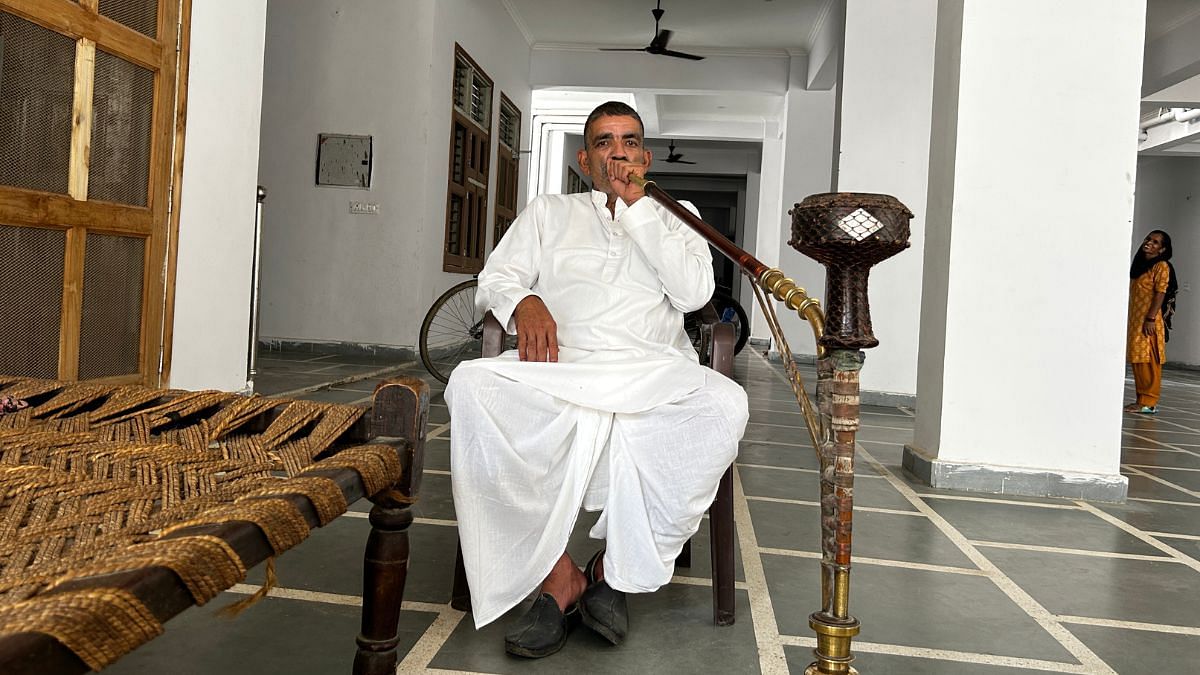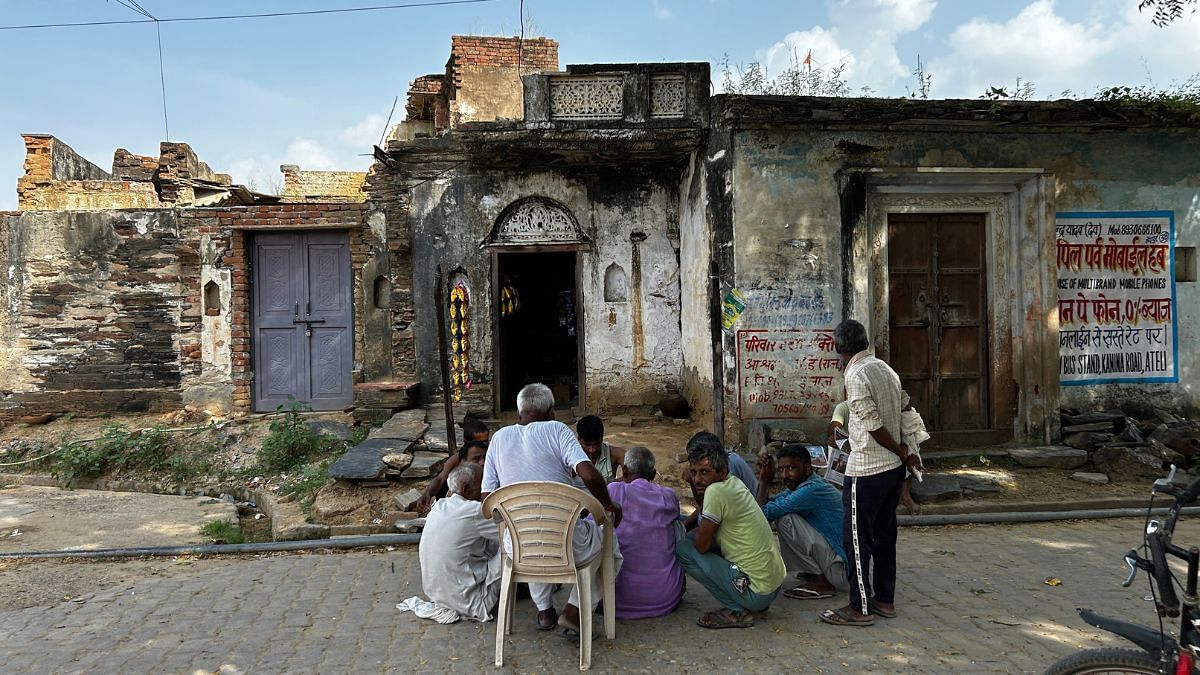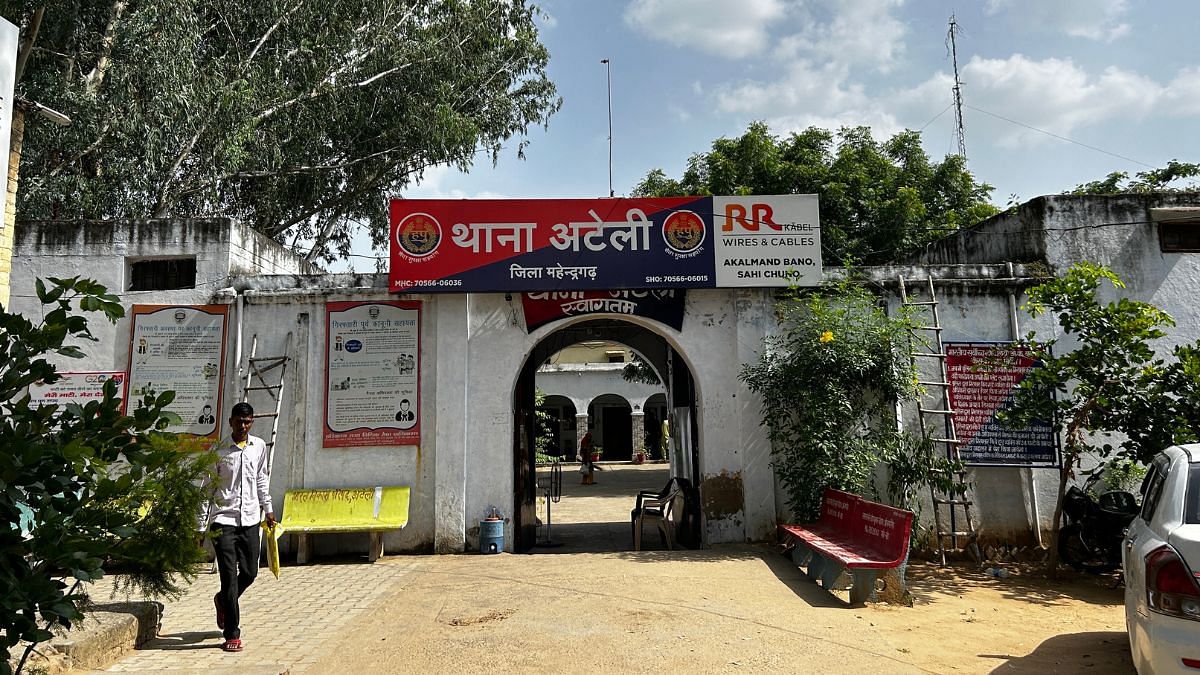hatehs
FULL MEMBER

- Joined
- Mar 10, 2023
- Messages
- 1,883
- Reaction score
- -2
- Country
- Location
Jobless Haryana men have a new mission in Muslim hate. ‘They think cow protection is govt job’
Young Hindu men from Jatwas had never been to Nuh, but they had seen videos of the violence. That’s when they found their own local enemy in Shakeel, the only Muslim in their village.
JYOTI YADAV
22 August, 2023 12:25 pm IST
https://twitter.com/intent/tweet?te...ection-is-govt-job/1724436/&via=theprintindia
https://api.whatsapp.com/send?text=...hey-think-cow-protection-is-govt-job/1724436/
https://www.linkedin.com/shareArtic...hate.+‘They+think+cow+protection+is+govt+job’

Text Size: A- A+
Mahendragarh/Rewari/Jhajjar: Shakeel came to Jatwas village in Haryana from Meerut 20 years ago to work as a barber in a highway shop. He is the only Muslim in the village of Hindu Jats and has never been made to feel he is any different. Then Nuh violence erupted. And his two-decade life in Jatwas came rapidly undone.
An angry mob of around two dozen young Hindu men stormed the village panchayat bhawan and called him “mullah” (a term for Muslim cleric used as a slur) and “aatankwadi” (terrorist).
“He is a threat to us,” shouted one from the crowd.
“He should leave. What if he is a terrorist like the rest of the Muslims?” screamed another.
What happened to Shakeel was the direct fallout of the Nuh violence in which six people were killed. The young men in the mob had never been to Nuh, but they had seen the videos of clashes, firing, and stone-pelting on their phones. That’s when they found their own local enemy in Shakeel.
All this hate did not come out of the blue. In recent months, the jobless men in Jatwas have wandered aimlessly on empty afternoons carrying their smartphones, after getting rejected by the Army and police in entrance exams. Idle minds have turned into WhatsApp workshops. Bhagat Singh is fast being replaced by Monu Manesar as group DPs. And WhatsApp groups have given them a new purpose – Muslim hate.
From here, it is a straight line to Haryana’s hate panchayats and Nuh-like flare-ups.
Also read: Muslims in Nuh say sons being targeted — ‘he had gone for tuition that day. Next day he was arrested’
United in hate
Hundreds of village panchayats in Mahendragarh, Rewari, and Jhajjar signed hate letters that came from Gurugram about a week after the violence in Nuh on 31 July. These resolutions called for a ban on entry of Muslims, a boycott of their economic activities and no sale of cattle to Mewat’s Muslims.The letters, which were more or less identical in content, even reached the offices of SHOs, SDMs, and DCs. Several gram panchayats and sarpanches were sent showcause notices for their ‘boycott Muslim’ call. In Rewari, deputy commissioner Mohammad Imran Raza, who had issued the notice to the panchayat, was transferred on Saturday.
“I was called for a peace meeting with the DC and SP in Jhajjar. I asked them if anyone is lynched for theft or cow smuggling, who will be responsible? The panchayat or the administration?” asked Chaudhary Sunil, who is in his 50s, the head of Guliya, a grouping of 84 Khap panchayat. He has been attending a series of such anti-Muslim panchayat meetings. “The panchayats have rightly issued an advisory that anyone entering their village has to show his identity card.”

Although these meetings made the village heads withdraw their hateful resolutions against Muslims letters and issue apology videos, Sudhir continues to justify them. The hate panchayats had attracted little national scrutiny in recent months until Nuh, but they are symptoms of ballooning Hindu anxieties and anger against Muslims spiralling across rural Haryana. Many of the heads of these panchayats are young men in their 30s and 40s. The elderly are not as susceptible to what comes in their WhatsApp groups or they are not on the chat platform altogether.
After police action and a guarantee by Shakeel’s Hindu employer, the mob backed off.
“But they will come again. And when they do, I will just leave,” Shakeel said.

There is no sizeable population of Muslims in this belt of Haryana. But the Mevs of Mewat have been coming to these villages for centuries to buy buffaloes that no longer give milk.
In the absence of direct conflict between Hindu and Muslim residents, the Mevs are paying a price now.
Also read: Rumours, ‘provocative’ videos, open wounds — Nuh tries to unravel what fuelled communal violence
The rise of ‘Hate Panchayats’
Tucked behind the sky-scrappers of Sector 57 in Gurugram lies a dilapidated, old yellow structure called Baarat Hall in Tigra village. On most days, this wedding hall serves as a home for stray cows. But, on the 6th of August, it transformed into a police cantonment, as a crowd of thousands gathered beneath tents, some speaking from the stage.Villagers had travelled miles in their tractors, bikes, and Fortuners to demand the release of four men arrested for killing a 19-year-old Imam in Tigra village’s only mosque after the Nuh Violence.
Soon, the meeting resounded with calls for an economic boycott of Muslims. Although the police registered cases against two speakers for delivering hate speeches, no arrests have been made so far. But the damage was done.
The videos from this hate panchayat reached Prem Sharma, a 32-year-old bus driver from Pachgaanv panchayat in Manesar, 20 kms from Tigra, within three to four hours.
A member of a WhatsApp group named ‘Hindu Bhai’, Prem recorded a voice note saying, “This is nothing. If the panchayat had been arranged in Pachgaanv, I would have killed five Muslims myself.”
Another member in the group responded with a similar, menacing voice note.
The competitive hate on the group started getting forwarded so many times that it came under police radar. Both the men who sent the voice notes were detained on 7 August.
Prem’s father Krishan Sharma, a farm worker earning a monthly salary of Rs 12,000, asked other village heads to help secure his son’s release from police custody.
“He was probably drunk. He usually sits with a mandali [gathering] of 10-15 men in the evening and he was influenced by the group,” Krishan explained. The SHO left his son with a warning after about six hours of detention.
Sharma came out on bail and resumed work. But the WhatsApp group and the forwards remain. His phone pinged again. Annother mahapanchyat was going to be held in Palwal.
The last one was held on 14 August and drawn new faces in the crowd. Among the crowd of thousands was Rajveer Sharma, a farmer in his 40s from Bisspur Akbarpur village. Sharma, a first-time sarpanch, attended the panchayat with two others from his village.
“The panchayat was held especially for the Jats as there was a lot of talk in Haryana about Jats not supporting the Hindu cause,” Rajveer said. One of the posters from the hate panchayat read: Not Brahmins, Kshatriyas, Vaishyas, Shudras, we are all Hindus first.”
Apart from the date of the next meeting on 28 August called Brij Mandal Shobhayatra, nothing else made it to the local newspapers the following day. But the provocative speeches had travelled quickly to WhatsApp groups such as “Hindu Bhai”.
Hindus were asked to pick guns and Muslims were called ‘Jihadis’.
“Our youth is ready to kill or get killed this time,” Brij Bhushan Saini, the national head of Dev Sena, is announcing in the video. Another person could be seen saying that the strategy is to not take women and children along at these panchayats.
Rajveer Sharma returned with a new goal. He is now preparing the village youth in Bisspur Akbarpur to send them to Shobha Yatra.
“Last time, we didn’t go. But this time we won’t miss,” Sharma said.
Also read: ‘I’ll be home soon’ — in Nuh, families remember last words of loved ones they lost in communal violence
A ‘new enemy’
The panchayat leaders are banking on the determination of young men to storm Nuh again on 28 August. While the police haven’t officially denied permission for the rally, they have been issuing warning against attending the yatra. There have been new recruitments in Bajrang Dal and Gau Rakshak Dal in the districts of Gurgram, Rewari, and Mahendragarh.
“We are learning the definitions of Gau Palak and Gau Rakshak,” said Kuldeep Yadav, 27, a 12th pass and a resident of Saidpur village. Older members of Gau Rakshak Dal and Bajrang Dal train the young men like Kuldeep, explaining the difference between a Gau Palak and Gau Rakshak. Kuldeep is told that if someone targets them for not being Gau Palak, then he needs to reply that being a Gau Rakshak doesn’t necessarily mean that they have to keep cows in their homes. ‘By virtue of being born in the Hindu religion, they become Sanatani and Gau Rakshaks.’ Kuldeep, who joined Bajrang Dal and Gau Rakshak Dal just four months ago, is learning these easy descriptors that would facilitate him and others on their highway hunt for trucks while avoiding any uncomfortable questions on social media or in local gatherings. His village, Saidpur, was the first to issue a hate letter against Muslims in Haryana.
Kuldeep is part of Bittu Lamba’s group of 10-15 men, who intercept trucks on the highway between Rewari and Narnaul. Bittu Lamba is emerging as the new Monu Manesar.
“More and more cows are killed and we are deeply pained as Gau Palak,” said Vikram Sharma, known as ‘Vikram Bhagwadhari’. He coordinates the Ateli team of Bajrang Dal and Gau Rakshak Dal.
But facts in the police files tell a different story. Mahendragrh SP Vikrant Bhushan said that there hasn’t been a single case of cow smuggling in the past year.
However, the new recruit Kuldeep is convinced that cow smuggling is rising. Saving the cow is now his way of serving both Hinduism and India.
“Our village head Vikas Yadav wrote the letter after some Muslim thief from Mewat had stolen cable and nozzles from 23 wells within just 15 days,” he said. Vikas Yadav has 7-8 police cases against him, including one under the Arms Act.
Petty thefts in the area are increasingly being blamed on either local Muslim residents or Meos who come for cattle trade. But when the police probe, they are catching Hindu men for these thefts – a Rajesh or a Ramesh from Rajasthan. Rajesh was stealing from the wells and selling the brass to a scrapper named Rajesh.

“During his 24th theft, he asked for a lift to the village from a man who belonged from there. That’s how he got exposed and the police were informed,” said ASI Rohtash Singh of Ateli Police Station.
But Kuldeep Yadav and other villagers continue to believe the lies about Muslims.
In the past seven years, Yadav, who claims to be “preparing for competitive examinations, failed entrance exams for Army and police jobs. Many of his classmates left the village after acing the exam for Army and police postings. Yadav watched them with envy. But now there is a new mission—to be a prideful Gau Rakshak in lieu of the jobs he dreamt of.
During the day, Yadav and his friends lie on cots forwarding messages on WhatsApp groups or asking friends to vote for the Hindu poster boy Elvish Yadav, who eventually won the Bigg Boss reality show, or celebrating a clean chit to Monu Manesar.
In the evening, they head to the highway.
“Some villagers believe that it [cow protection] is a government job that we are executing and some believe that we are extortionists. That’s why Hindus are divided and defeated,” Vikram ‘Bhagwadhari’ lamented.
Ajit Singh, a VHP worker in Ateli block, who was a part of the 31st Shobha Yatra in Nuh, came home after being stranded in a temple for three hours. A bullet hit his car, which he is still getting fixed. But he asked his young daughter to prepare a song for the Independence Day celebration in her school.
The song is called “Hindu Hain Hum’ (We Are Hindus). Sung by one Kavi Singh, it was released on YouTube after the Nuh violence. The song has garnered more than 3 lakh views already and is fast becoming the new anthem on DJs for Hindu youth riding the ‘hate Muslim’ wave.
The lyrics of the song evoke what happened on 31 July: “We have seen Mewat on fire and how the system did not do anything. We will pick arms to save ourselves. We will now show the bloodbath. We will hoist Bhagwa on each home.”
This is the song that Singh wanted his child to sing in school. “Some teachers raised objections that this song isn’t for Independence Day celebration. But I was adamant that my daughter had prepared it for so long and she will perform on this,” Singh told ThePrint. On the advice of senior VHP members, Singh is currently keeping a low profile in order to not attract any unwanted police attention.
(Edited by Prashant)
